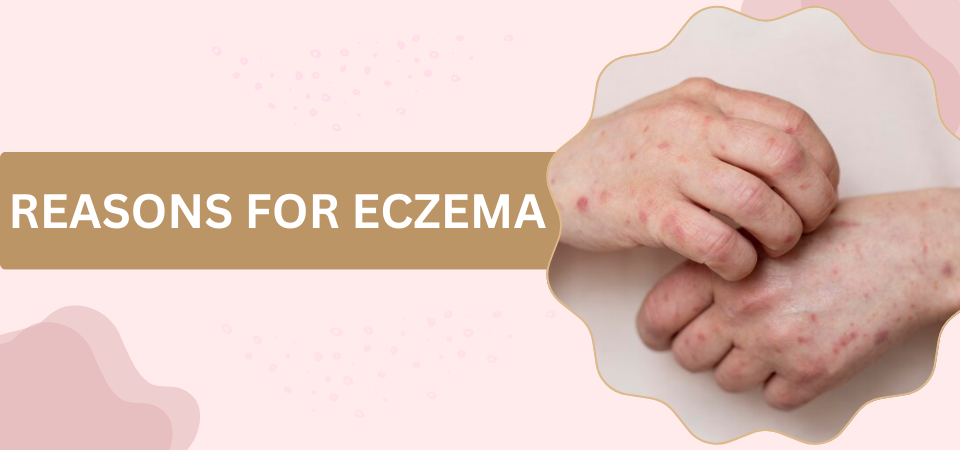
Treating Heat Rash
May 2, 2024
Laser Treatment for Pigmentation
June 18, 2024Eczema, also known as atopic dermatitis, is a chronic skin condition. It is characterized by inflammation, redness, dryness, and itchiness. It often appears as patches of rough, scaly skin that can range from mild to severe. Eczema can affect people of all ages, but it is most common in infants and children.
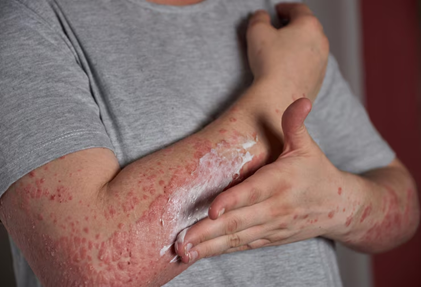
In this comprehensive guide, you will learn about the various reasons for eczema. This will allow you to make more informed decisions and improve your skin health. Dr. Anju Methil is a renowned dermatologist in Andheri, Mumbai. She has guided numerous patients through their eczema journey. With a compassionate approach, emphasizing personalized care and evidence-based treatments.
Eczema manifests differently in each individual, making its causes complex and varied. Through this guide, delve into the factors contributing to eczema. Empower yourself with knowledge for better skin health.
Consult with an expert dermatologist for personalized guidance on managing eczema.
Curious about the causes? Let’s uncover the primary reasons for eczema.
What is the main cause of Eczema?
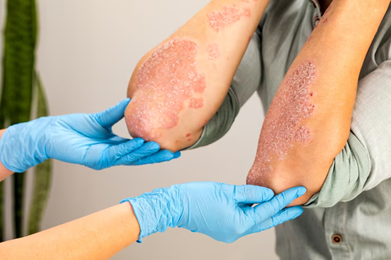
Eczema is triggered by a combination of genetic, environmental, and immune system factors. Some of the major causes of eczema rash are as follows:
- Genetic predisposition:
Individuals with a family history of allergic conditions. These include asthma, hay fever, and eczema. They are more likely to develop eczema themselves.
- Environmental factors:
Triggers such as irritants, allergens, changes in temperature or humidity, stress, and certain foods can exacerbate eczema symptoms.
- Skin barrier abnormalities:
Defects in the skin’s protective barrier function may contribute to the development of eczema. This allows irritants and allergens to penetrate the skin more.
- Immune system dysfunction:
Immunity dysfunction contributes to the inflammation seen in eczema. It is due to an overactive response to environmental triggers.
Eczema is likely the result of a complex interaction between genetic predisposition, environmental triggers, skin barrier abnormalities, and immune system dysfunction.
Seek guidance from a reputed dermatologist to identify and manage eczema triggers effectively. Book your appointment today!
Let’s explore the different types of eczema.
Types of Eczema
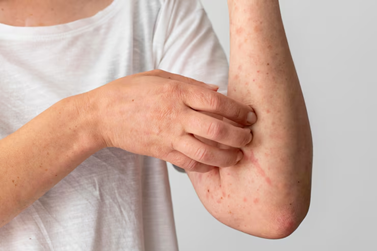
- Atopic Dermatitis: Often genetic, with red, itchy patches on hands, feet, elbows, and knees.
- Contact Dermatitis: Caused by irritants like soaps or allergens like poison ivy, resulting in redness and itching.
- Nummular Eczema: Circular patches triggered by dry skin or environmental factors.
- Dyshidrotic Eczema: Small blisters on palms, soles, or fingers, often stress-induced.
- Seborrheic Dermatitis: Affects oily areas like the scalp, face, and chest, causing red, scaly patches.
- Stasis Dermatitis: Linked to poor circulation, primarily in the lower legs, causing swelling and redness.
Consult a dermatologist for personalized management strategies based on your eczema subtype.
Let’s delve into the triggers of eczema.
What Triggers Eczema
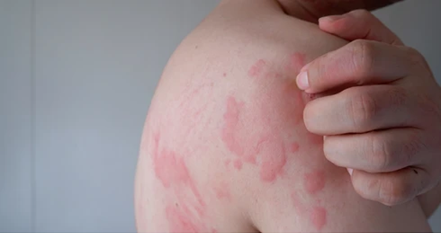
Eczema triggers vary from person to person. But, identifying and avoiding them is essential for managing symptoms effectively. Dr. Methil outlines common triggers, including:
- Allergens:
Pollen, pet dander, and dust mites can exacerbate eczema symptoms in allergic individuals.
- Irritants:
Harsh soaps, detergents, and chemicals can strip the skin of its natural oils, leading to dryness and inflammation.
- Stress:
Emotional stress can weaken the immune system. It triggers eczema flare-ups in susceptible individuals.
- Weather:
Extreme temperatures can lead to flare-ups. This includes humidity changes and dry air can aggravate eczema symptoms.
Consult with a skincare expert for personalized advice on managing eczema triggers effectively. Book your appointment today!
Let’s unravel the connection between eczema and allergies.
Is Eczema an Allergy?
Eczema is not only caused by allergies, but it might contribute to its development and severity. Eczema is a chronic inflammatory skin condition marked by dry, itchy skin and rashes.
While skin allergies are not the main cause, they are frequently related to eczema. Particularly it happens in cases of atopic dermatitis. Eczema sufferers may experience allergic reactions to particular items. This includes foods, pollen, pet dander, or environmental irritants. It can trigger or worsen their symptoms.
However, eczema can also be caused by hereditary factors. Immune system dysfunction and environmental stressors may be some of the factors. As a result, while allergens can cause eczema, they are only one piece of the puzzle in understanding this complex skin condition.
Seek guidance from an experienced dermatologist to determine the underlying factors contributing to your eczema.
Discovering solutions for eczema is crucial. Let’s explore effective treatments for eczema.
Eczema Treatment
Managing eczema involves a multifaceted approach aimed at relieving symptoms and preventing flare-ups. Dr. Anju Methil discusses various treatment modalities, including:
- Topical Steroids: Anti-inflammatory creams or ointments help reduce redness and itching during flare-ups.
- Moisturizers: Regular application of emollients keeps the skin hydrated, preventing dryness and minimizing irritation.
- Antihistamines: Oral antihistamines may alleviate itching and promote better sleep, especially during nighttime flare-ups.
- Avoidance of Triggers: Identifying and avoiding trigger factors, such as allergens and irritants, is crucial for long-term management.
Consult with a skincare expert to develop a personalized treatment plan for your eczema.
Now, let’s explore preventive measures for managing eczema.
Preventing Eczema
Eczema is not entirely preventable. Certain strategies can help minimize flare-ups and maintain skin health. Dr. Methil emphasizes the importance of:
- Regular Moisturization:
Keep the skin well-hydrated with moisturizers. It helps prevent dryness and reduces the risk of flare-ups.
- Gentle Skincare:
Use mild, fragrance-free skincare products. This minimizes irritation and maintains the skin’s natural barrier function.
- Stress Management:
Practice stress-reduction techniques. These include meditation and yoga. It can help minimize eczema flare-ups triggered by emotional stress.
- Avoiding Triggers:
Identify and avoid personal eczema triggers. These include specific foods or environmental allergens. This is key to preventing flare-ups.
Consult with a skincare expert for personalized guidance on preventing eczema flare-ups.
Let’s wrap up our exploration of eczema causes and management strategies.
Conclusion
In conclusion, eczema is a multifactorial skin condition. By understanding its causes and triggers, individuals can take proactive steps to manage their symptoms effectively.
At Skin and Shape Clinic, Dr. Anju Methil and her team are committed to providing personalized care and innovative treatments for eczema and other dermatological concerns. Follow the advice given by her and embark on your journey towards healthier, happier skin.
FAQs
Can eczema go away?
Eczema can often be managed effectively, though it may not permanently go away and can recur throughout a person’s life.
Is eczema curable?
Eczema is considered a chronic condition for which there is no known cure, but treatments can help manage symptoms.
What foods trigger eczema?
Common foods that may trigger eczema flare-ups include dairy products, eggs, nuts and seeds, soy products, and wheat.
Does eczema spread by touch?
Eczema is not contagious and does not spread by touch from one person to another.
Is eczema genetic?
Eczema is often genetic, with a higher likelihood of occurrence if there is a family history of the condition.

